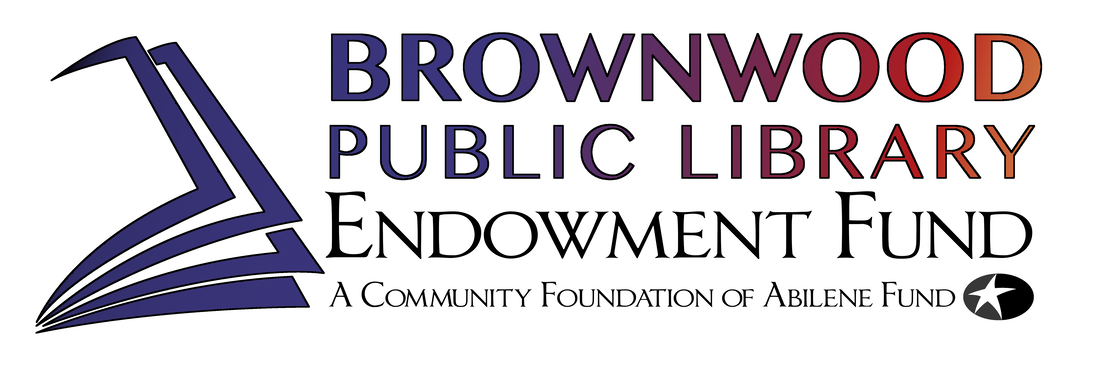Brownwood Community Library Association Policies
Library Card Issuance
Library cards for patrons over 18 years of age may be obtained by filling out a user agreement in person at the library. Two proofs of current residence address are needed. Patrons will also need to supply a reference, as indicated in the user agreement.
Student cards can be issued to children who are in the first grade or higher. A parent or guardian must be present in person and sign for anyone under 18 years of age.
Young children may use a parent’s card.
Student cards can be issued to children who are in the first grade or higher. A parent or guardian must be present in person and sign for anyone under 18 years of age.
Young children may use a parent’s card.
Carnegie Room Use Policy
The library has two meeting rooms. The larger of the two, the Carnegie Room, will hold a maximum of 30 individuals and a second smaller meeting room, Meeting Room #2, will allow 10 individuals.
| carnegie_room_policy.pdf | |
| File Size: | 155 kb |
| File Type: | |
Computer Acceptable Use Policy
- All patrons must have a library card to use the library computers.
- All patrons must fill out and sign the "Computer Consent" acknowledge they have read this policy statement and agree to abide by its terms.
- Each patron under 18 (a minor) must have a parent or legal guardian physically present to sign the Computer Consent before first using a computer.
- A maximum of one computer per card may be checked out at any given time.
- Minors may not share a computer without the express written consent of their parent of parents, parents must be physically present.
- A time limit of two hours per user per day will be enforced if there are other users waiting for a computer. If nobody else needs a computer, patrons may stay on during designated library hours as long as they choose.
- Reservations for a computer may be made up to one week in advance of the desired time, or times. A minimum of two hours advance notice will be required for reserving a computer. For example, if a computer is desired for 4:00 p.m. of a certain day, then a reservation must be made 2:00 p.m. of that same day.
- Only one reservation a day will be permitted.
- Each user must present his or her library card to a library staff member before using any computer. The library staff will take custody of the card until the user finishes, at which time the user must pick up the card.
- Users must pull the white flap over their computer if they should need to leave the computer temporarily (for example, to use the restroom or to get other materials).
- The use of the Internet is free to users who meet certain criteria described in this policy statement except for a fifteen cent per page charge to print. The available printer is a black-and-white laser printer with no color capabilities. Proceeds from the printing charge will be used to recoup the library’s costs for providing printing services.
- Patrons are welcome to use any other programs installed on the computers in addition to the Internet. Patrons are not permitted to create, download, or otherwise commit files to the C drive (hard drive). Patrons may, however, use the A drive (utilizing a standard three-inch floppy disk formatted for Windows). If the user does not have such a disk, he or she may buy one or more at the circulation desk at a cost of one dollar per disk. It is important that patrons conform to these guidelines to protect their privacy and to insure that they can access their materials at a later date; the hard drives will be routinely expunged of non-system files without advance notice.
- Patrons are also expected to maintain due vigilance and care in avoiding computer viruses and Trojan horses. The library does have certain virus software installed but it is not fail-safe. While the library has adopted measures designed to control the proliferation of viruses and Trojan horses, the library assumes no responsibility for any and all damage that may occur as a result of viruses and/or Trojan horses.
- Patrons must notify the library staff of any problems or irregularities with the computers as soon as they occur. Patrons must NOT alter any settings presently on the computers.
- Patrons are welcome to access any materials on the Internet except those materials which are deemed obscene or proscribed by pertinent laws. Library staff will assert full discretion as to what constitutes inappropriate materials or conduct. Adults are allotted one warning regarding such materials. Minors will have their Internet privileges suspended until a parent or legal guardian is notifies of the problems. Disposition of a minor’s privileges will be determined by the Library Director after consulting with the minor’s parents or legal guardian.
- Library staff will make a reasonable effort to ensure that minors do not access materials deemed inappropriate to ensure an environment, amenable to all users. However, neither Brownwood Public Library, nor its staff assumes any liability regarding materials accessed on the computers; liability rests solely with the parents. Parents are strongly encouraged to monitor what their children view on the computer.
- In addition to the above guidelines, users will also be expected to abide by any additional instructions prescribed by library staff from time to time. Charges for floppy disks or printing services may be changed at any time or times. In addition, this policy statement may be changed from time to time; if deemed desirable by the library, patrons may be asked to sign a new "Computer Consent" covering such changed policy statement.
- Please ask if any assistance is needed. The library staff is here to help the computer users.
- Happy surfing!
Internet Safety Policy
| Brownwood Library Internet Safety Policy | |
| File Size: | 14 kb |
| File Type: | docx |
Collection Development Policy
| collection_development_policy.docx | |
| File Size: | 17 kb |
| File Type: | docx |
Acceptable Patron Behavior Policy
The Carnegie Library Association of Brownwood has established this Behavior Policy to ensure that library facilities are safe, welcoming and provide equitable access to materials and services to all library users. Appropriate personal library conduct includes activities such as reading, studying and using library materials and computers in a manner that does not interfere with others who are using the library in like fashion.
All patrons are expected to display appropriate and courteous behavior when using any facility of the Brownwood Public Library. Patrons shall respect the rights and not harass or annoy any library patron, staff and volunteer.
Library response to inappropriate behavior
Inappropriate behavior
Inappropriate behavior would include, but is not limited to, the following conduct or behaviors:
All patrons are expected to display appropriate and courteous behavior when using any facility of the Brownwood Public Library. Patrons shall respect the rights and not harass or annoy any library patron, staff and volunteer.
Library response to inappropriate behavior
- Advise the patron that their conduct is not permitted and request that they stop the behavior or they will be asked to leave. In cases where the behavior cannot be immediately remedied (i.e., public drunkenness), patron will be asked to leave.
- If the patron does not cease behavior, the patron will be asked to leave. The police will be contacted if the patron refuses to leave.
- If the patron’s behavior threatens the safety of any other person or property, or if patron is breaking the law, the police shall be called immediately.
- For serious offenses or if a patron is engaging in behavior that he or she has already been asked to remedy, a ban of between one day and one year will be issued, depending on the nature and seriousness of the offense. The offending patrons (if they can be reached) and all staff shall be notified in writing of the reasons for the banning and the dates covered by the banning. A copy will also be sent to the police and the board shall be notified. Banned patrons will be reported to the police as trespassing if they return to the library.
- Repeated offenses after the initial ban will result in subsequent bans, up to and including a lifetime ban.
Inappropriate behavior
Inappropriate behavior would include, but is not limited to, the following conduct or behaviors:
- Loud, disruptive conversations, including shouting
- Use of personal electronic equipment at a volume that can be heard by others
- Profane and/or abusive language
- Sleeping
- Destruction or vandalism of library or personal property
- Intentionally behaving in a manner that could reasonably be expected to annoy or disturb patrons or staff, including prolonged staring, stalking, harassing, photographing
- Possessing, selling, distributing, consuming or being under the influence of any alcoholic beverage or controlled substance
- Committing or attempting to commit any activity that would constitute a violation of any federal, state or local ordinance
- Smoking or other use of tobacco (including e-cigarettes) except in designated areas outside
- Leaving young children unattended on library premises
- Engaging in sexual contact, activities or conduct
- Selling, soliciting or surveying; distributing written materials
- Canvassing for any political, charitable or religious purpose on library grounds without prior authorization of library director
- Eating or drinks without secure lids in the library
- Using the library with a bodily hygiene so offensive that it constitutes a nuisance to others
- Creating a public safety hazard or unsanitary condition
- Interfering with the safe and free passage of the library patrons or staff on the premises including, but not limited to, placement of objects in walkways in manner that impedes free passage. Unattended items may be removed from library premises if they appear to be abandoned or have been left unattended for 30 minutes or more
- Improperly using library restrooms or facilities for purposes such as bathing, shaving or laundering
- Violating the library’s rules for acceptable use of the Internet and public computers. Attempting to disrupt or change the computer software or hardware
- Illegally possessing, selling, distributing, displaying or using any dangerous weapon
- Wearing of outfits that would be considered inappropriate by a reasonable, average community member, including, but not limited to, bathing suits, going barefoot or bare-chested
Security Camera Policy
| security_camera_policy.docx | |
| File Size: | 16 kb |
| File Type: | docx |




